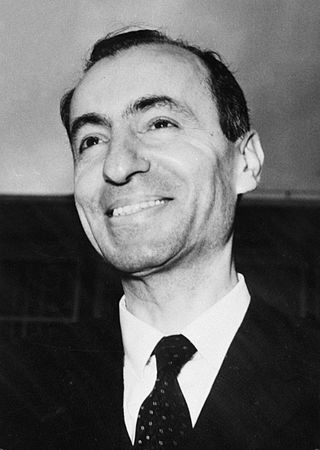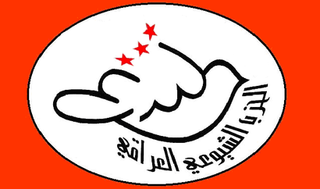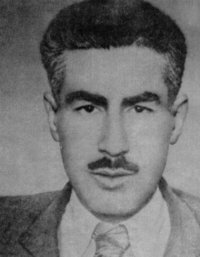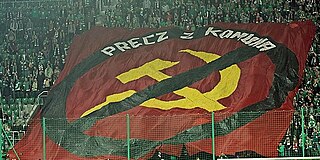Related Research Articles
Post-communism is the period of political and economic transformation or transition in post-Soviet states and other formerly communist states located in Central-Eastern Europe and parts of Latin America, Africa, and Asia, in which new governments aimed to create free market-oriented capitalist economies. In 1989–1992, communist party governance collapsed in most communist party-governed states. After severe hardships communist parties retained control in China, Cuba, Laos, North Korea, and Vietnam. SFR Yugoslavia began to disintegrate, which plunged the country into a long complex series of wars between ethnic groups and nation-states. Soviet-oriented communist movements collapsed in countries where they were not in control.

The United Arab Republic was a sovereign state in the Middle East from 1958 until 1961. It was initially a political union between Egypt and Syria from 1958 until Syria seceded from the union following the 1961 Syrian coup d'état. Egypt continued to be known officially as the United Arab Republic until September 1971 when it was formally dissolved by Anwar Sadat.

The Lebanese Civil War was a multifaceted armed conflict that took place from 1975 to 1990. It resulted in an estimated 150,000 fatalities and also led to the exodus of almost one million people from Lebanon.

Michel Aflaq was a Syrian philosopher, sociologist and Arab nationalist. His ideas played a significant role in the development of Ba'athism and its political movement; he is considered by several Ba'athists to be the principal founder of Ba'athist thought. He published various books during his lifetime, such as "The Road to Renaissance" (1940), The Battle for One Destiny (1958) and The Struggle Against Distorting the Movement of Arab Revolution (1975).

The Iraqi Communist Party is a communist party and the oldest active party in Iraq. Since its foundation in 1934, it has dominated the left in Iraqi politics. It played a prominent role in shaping the political history of Iraq between its foundation and the 1970s. The Party was involved in many of the most important national uprisings and demonstrations of the 1940s and 1950s. It suffered heavily under the Ba'ath Party and Saddam Hussein but remained an important element of the Iraqi opposition and was a vocal opponent of the United Nations sanctions imposed on Iraq after the Gulf War of 1991. It opposed the United States invasion of Iraq in 2003 but since then has participated in the new political institutions. It received little support in the Iraqi general elections of 2005. The party gained some seats in each province in which the 2013 Iraqi governorate elections were held.

Yusuf Salman Yusuf, better known by his nom de guerre Comrade Fahd, was one of the first Iraqi communist activists. He was the first secretary of the Iraqi Communist Party, from 1941 until his death on the gallows in 1949. He is generally credited with a vital role in the party's rapid organizational growth in the 1940s. For the last two years of his life, he directed the party from prison.

The Lebanese Communist Party is a communist party in Lebanon. It was founded in 1943 as a division of the Syrian–Lebanese Communist Party into the Syrian Communist Party and the Lebanese Communist Party; but the division was only implemented in 1964.

Khalid Bakdash was a Syrian politician who was the founder of the Syrian Communist Party (SCP) and lead it from 1936 until his death in 1995. In 1954, Bakdash became the first member of a communist party to be elected to an Arab parliament. He has since been called the "dean of Arab communism".

The Revolutions of 1989, also known as the Fall of Communism, was a revolutionary wave of liberal democracy movements that resulted in the collapse of most Marxist–Leninist governments in the Eastern Bloc and other parts of the world. Sometimes this revolutionary wave is also called the Fall of Nations or the Autumn of Nations, a play on the term Spring of Nations that is sometimes used to describe the Revolutions of 1848 in Europe. It may have contributed to the eventual dissolution of the Soviet Union—the world's largest Marxist–Leninist state—and the abandonment of communist regimes in many parts of the world, some of which were violently overthrown. The events, especially the fall of the Soviet Union, drastically altered the world's balance of power, marking the end of the Cold War and the beginning of the post-Cold War era.

Christianity in Lebanon has a long and continuous history. Biblical Scriptures show that Peter and Paul evangelized the Phoenicians, whom they affiliated to the ancient Patriarchate of Antioch. Christianity spread slowly in Lebanon due to pagans who resisted conversion, but it ultimately spread throughout the country. Even after centuries of Muslim rule, it remains the dominant faith of the Mount Lebanon region and has substantial communities elsewhere.

Christianity, which originated in the Middle East during the 1st century AD, is a significant minority religion within the region, characterized by the diversity of its beliefs and traditions, compared to Christianity in other parts of the Old World. Christians now make up approximately 5% of the Middle Eastern population, down from 13% in the early 20th century. Cyprus is the only Christian majority country in the Middle East, with Christians forming between 76% and 78% of the country's total population, most of them adhering to Eastern Orthodox Christianity. Lebanon has the second highest proportion of Christians in the Middle East, around 40%, predominantly Maronites. Egypt has the next largest proportion of Christians, at around 10% of its total population. Copts, numbering around 10 million, constitute the single largest Christian community in the Middle East.

The Kurdish Democratic Party in Lebanon or Parti Democratique Kurde – Liban (PDK-L) in French, is the Lebanese branch of a namesake Iraqi-based Kurdish nationalist party, established by Jamil Mihhu in 1960, and based in Lebanon. However, it was not licensed until 24 September 1970.

Anti-communism is political and ideological opposition to communist beliefs, groups, and individuals. Organized anti-communism developed after the 1917 October Revolution in the Russian Empire, and it reached global dimensions during the Cold War, when the United States and the Soviet Union engaged in an intense rivalry. Anti-communism has been an element of many movements and different political positions across the political spectrum, including anarchism, centrism, conservatism, fascism, liberalism, nationalism, social democracy, socialism, leftism, and libertarianism, as well as broad movements resisting communist governance. Anti-communism has also been expressed by several religious groups, and in art and literature.
Daud as-Sayegh was an Iraqi communist politician. As-Sayegh was a Christian lawyer from Mosul. He joined and left the Iraqi Communist Party several times during the 1940s and 1950s.

Afif al-Bizri was a Syrian career military officer who served as the chief of staff of the Syrian Army between 1957–1959. He was known for his communist sympathies, and for spearheading the union movement between Syria and Egypt in 1958.
The Anti-Zionist League in Iraq was an organization in Iraq, active in 1946. The organization was founded by a group of Jewish members of the Iraqi Communist Party in 1945.
"A free homeland and a happy people" is an Arabic communist slogan. It was the slogan of the Syrian-Lebanese Communist Party, first adopted at the first conference of the Political Committee of the party. The slogan was adopted by the Iraqi Communist Party at its clandestine first national conference held in March 1944.
Artin Madoyan was a Lebanese-Armenian communist politician. He was the most prominent Armenian leader of the Lebanese Communist Party. He was seen as the 'right hand' of Syrian communist leader Khalid Bakdash.

Ali Salih al-Sa'di was an Iraqi politician. He was General Secretary of the Iraqi branch of the Baath Party from the late 1950s until the November 1963 Iraqi coup d'état. From February 8, 1963 until the November 1963 Iraqi coup d'état, he was Deputy Prime Minister under Ahmed Hassan al-Bakr, Minister of the Interior and as Commander of the National Guard.
Yusuf Yazbek (1901–1982) was a Lebanese journalist and politician who cofounded the Lebanese People's Party which was the forerunner of the Syrian–Lebanese Communist Party. He also involved in the establishment of the Syrian–Lebanese Communist Party.
References
- 1 2 3 Walter Laqueur (1956). Communism and Nationalism in the Middle East. Praeger. pp. 184, 190.
- ↑ Mohammed Shafi Agwani (1969). Communism in the Arab East. Asia Pub. House. p. 33. ISBN 9780210981573.
- ↑ Ost-Probleme, Vol. 3, Eds. 27–52. 1951. p. 977.
- ↑ Robert Alan Fernea (1991). The Iraqi revolution of 1958: the old social classes revisited. Tauris. p. 179. ISBN 978-1-85043-318-7.